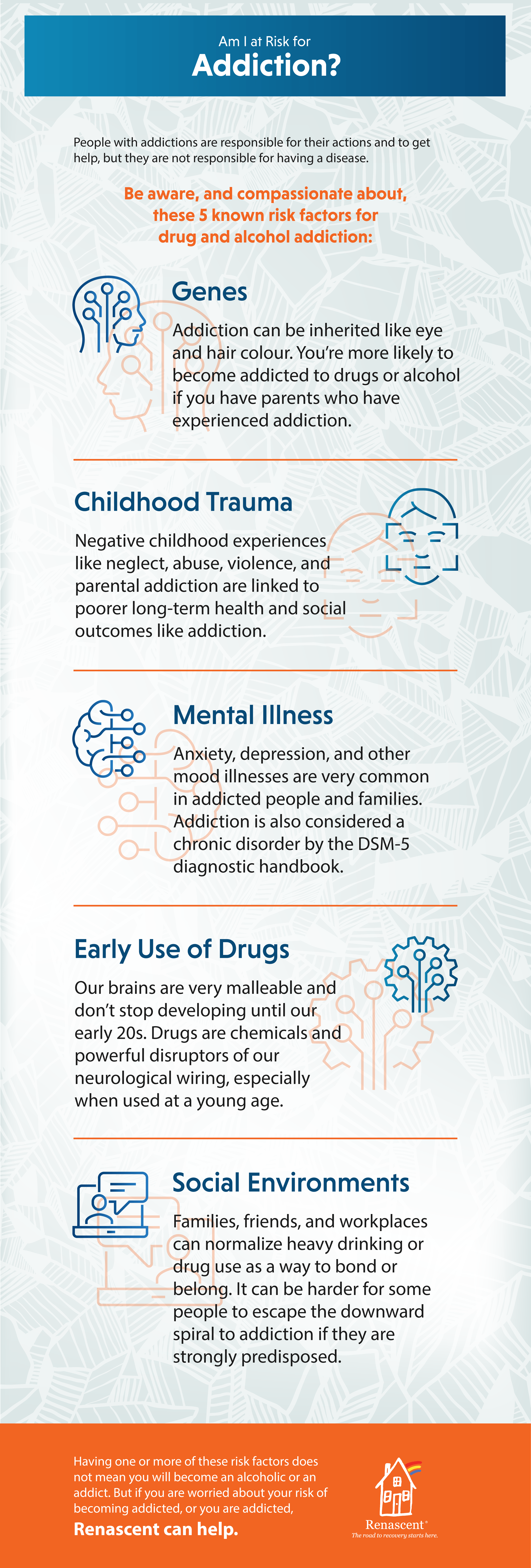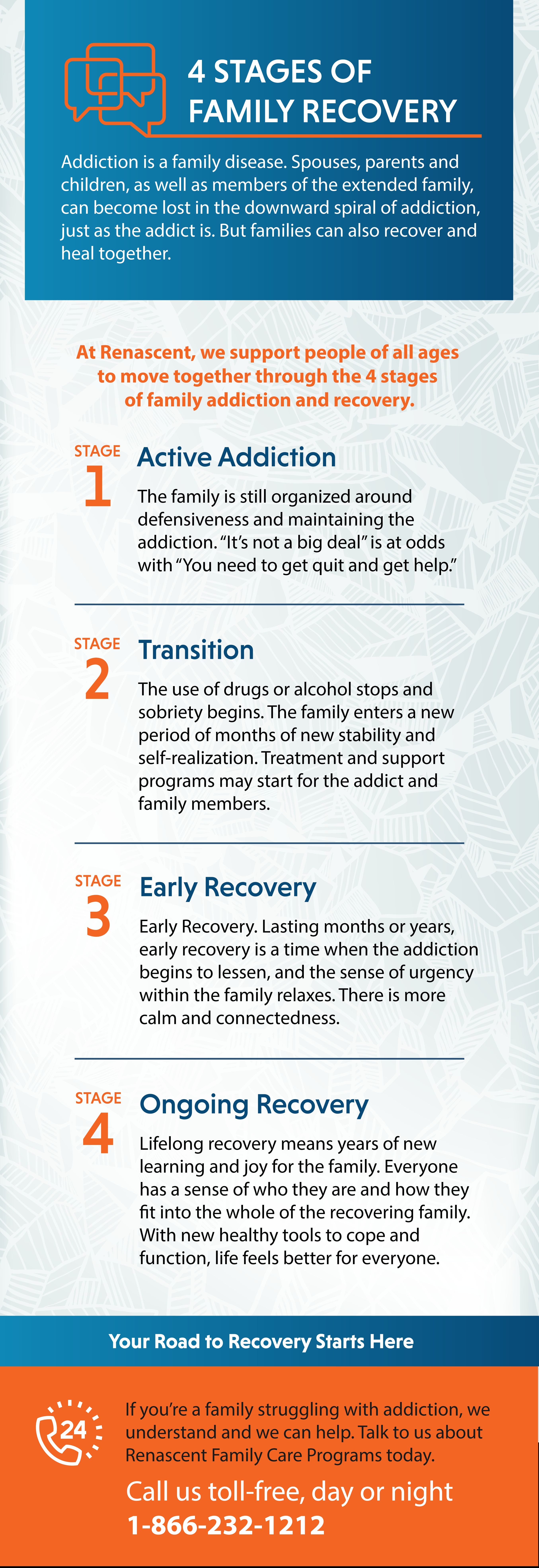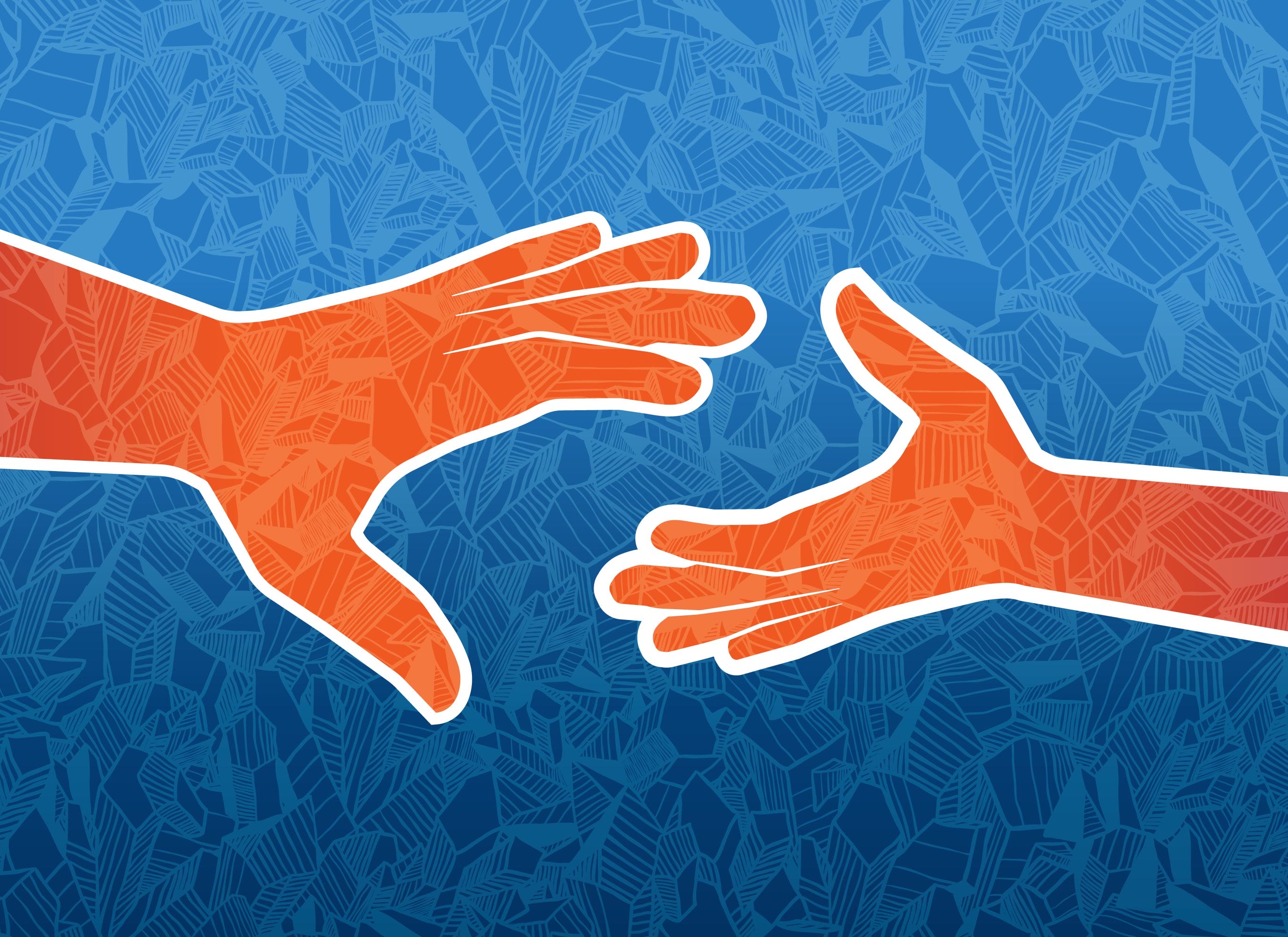Meth, or methamphetamine, is an illegal, highly addictive, and dangerous drug.
According to the Canadian Centre on Substance Use and Addiction, the prevalence of meth use in Canada is low compared to other drugs, but the availability of meth is increasing.
The risks of using and becoming addicted to this powerful drug includes overdose, psychosis, and violent psychotic symptoms — serious side effects that put users, friends, and healthcare professionals in harm’s way. It is easy to become addicted to meth, but with help, quitting is also possible.
In this article, we’ll explain the risks of using meth, the signs and symptoms of meth addiction, and how to get help for the whole family if you or someone you love is addicted to meth.
At Renascent, we know about addiction, and we can help. Your journey to recovery from meth addiction starts here.
What is Meth?
Meth, or crystal meth, are two common names for the illegal drug methamphetamine. Meth is also sometimes referred to as chalk, crank, and ice, as well as several other street names.
Meth is a type of amphetamine drug — a group of powerful stimulants or “uppers” that speed up the body’s central nervous system. Depending on the form it is sold in, it can be swallowed, snorted, smoked, or injected.
Methamphetamine is a dangerous drug. It’s highly addictive and easy to overdose on. It’s made in illegal backroom labs with cheap and often dangerous ingredients, so the strength and safety of meth are often unknown to both sellers and users.
Meth used to be prescribed by doctors to treat obesity and attention-deficit/hyperactivity disorder (ADHD). And while it can still sometimes be prescribed in the United States, meth is not a legal drug in Canada.
Meth Use in Canada
A 2012 study cited by the Centre for Addiction and Mental Health (CAMH) estimated that there are roughly 52,000 methamphetamine users each year in Canada. This same study went on to say that the actual number of users may be much higher due to the nature of self-reporting drug-use surveys.
According to CAMH, the low cost and availability of meth means more people might be using it. In particular, more young adults are using it at parties and nightclubs, and cocaine users sometimes substitute meth for cocaine because the effects are similar for a lower cost.
Among students, CAMH also reports that a 2011 survey of Ontario youth in grades 7 to 12 found that 1% had used methamphetamine at least once in the past year. The 2017 Ontario Student Drug Use and Health Survey more recently found that after peaking in the late 1970s/early 1980s and again in the late 1990s, meth use is at an all-time low among students in grades 9 to 12.
Sign and Symptoms of Meth Addiction
Addiction can creep up until all of a sudden; what was once a choice becomes an urgent necessity.
And while the progression from use to addiction is different for everyone, a common pattern is how often the user denies, rationalizes, and underestimates their drug use, along with the consequences of the drug use on their lives, and the lives of people around them.
If you aren’t sure if you are addicted to meth, here are some questions to ask yourself:
- Have you tried to stop using meth, and stay stopped, for an extended period of time?
- Was your attempt to quit successful?
- If you have never tried, do you really know you can quit anytime you want to?
- How do you feel at your job?
- Is your work being affected by your substance use?
- Are you having problems with your family members, including partners and children?
- Are you struggling to deal with your family’s concerns about your drug use or feeling defensive about their nagging to quit or cut back?
There are also some common signs and symptoms of meth addiction to watch out for. Do you find yourself struggling with:
- Strong cravings for meth?
- Using more meth, and more often?
- Withdrawal symptoms such as stomach pain, hunger, headaches, shortness of breath, tiredness, and depression?
These are all common signs you, or someone you love, might have an addiction to methamphetamine. At Renascent, we understand addiction and how hard it is to quit, and we can help. We’ve helped over 50,000 people recover from substance addictions and we can help you and your family too.
Am I an Addict?
Yes, you might be addicted to meth. But don’t let the label “addict” stop you from getting the help you need to quit.
Addicts are always people first, just like anyone else. And there is treatment available to help you fully recover from your meth addiction.
Addiction is considered a chronic disorder by the DSM-5 (Diagnostic and Statistical Manual of Mental Disorders, version 5), a handbook used widely by doctors to guide diagnosis of mental disorders and addictions.
This means that if you’re experiencing problems as a result of your meth use, it doesn’t make you a bad person — it means you are a person with a psychiatric brain disorder or disease that can be treated like any other health condition.
And in Ontario, addiction is recognized as a disability in the Human Rights Code, so you are protected against discrimination based on your addiction from anyone you need to tell: at work, at school, with your doctor, or elsewhere in your life.
Remember, there’s a very good reason why the first step of the 12-Step Program to addiction recovery is asking for help. Admitting out loud that you need help, and that you have an addiction you are powerless over, is a hard step, but one that will truly set you on the path to freedom from your addiction.
Risk Factors for Meth Addiction
Science and medical guidelines like the DSM-5 handbook tell us there are underlying biological and genetic reasons people get addicted to drugs and alcohol, meaning addiction can be treated like any other health disease.
There are other social factors that can increase our risk for addiction too. Understanding these risks can make it easier to confront our addiction and ask for the help and forgiveness we need to recover.

The Effects of Meth on Your Body
Using meth can cause some unpleasant and unwanted side effects including racing of the heart, chest pain, dryness of the mouth, anxiety, restlessness, nausea, vomiting, diarrhea, overheating, and physical tension. Other negative effects of using meth are paranoid delusions, hallucinations, aggressive behaviour, and impulsive violence.
Once the effects of meth have worn off, sometimes as long as 12 hours after its taken, users often also feel tired and depressed, leading them to take more meth to feel better, or continuously using over a period of days or weeks, inviting addiction and overdose.
If you use needles to take methamphetamine, you also risk spreading or catching serious infections like hepatitis or HIV. People using methamphetamine are also more likely to make make risky decisions about sex, putting them at a greater risk of catching and spreading HIV.
The Centre for Addiction and Mental Health warns that regular use of methamphetamines over a long period of time can lead to amphetamine psychosis. The symptoms of amphetamine psychosis include hallucinations, delusions, paranoia, and bizarre and violent behaviour. This is a dangerous state for users and the people around them. Meth users can become hostile and violent in their disconnect from reality. They may self-mutilate, attempt suicide, or attack others for no reason.
Long-term regular use of meth can also cause:
- Severe tooth decay (meth mouth);
- The feeling of bugs under your skin, leading to skin-picking and sores;
- Loss of appetite and weight loss;
- Trouble sleeping;
- Increased risk of heart disease, stroke, impaired thinking, poor memory, and Parkinson’s disease.
Using meth even once can lead to overdose. Overdosing on meth can have serious consequences, including heart attack, seizure, stroke, and death.
Meth Addiction Treatment – How To Quit Meth
At Renascent, with our 50 years of experience, we believe that complete abstinence is the best meth addiction treatment if you’ve crossed the line from heavy use to addiction. With abstinence-based treatment, even those with the most serious of drug addictions can find renewed health and healing, and a truly transformative experience.
Choosing an accredited, personalized, and abstinence-based treatment is recommended for meth addiction. For example, our comprehensive, Toronto-region, meth addiction treatment programs take place in safe, serene, and caring environments inside beautifully restored heritage homes. Our abstinence-based model integrates 12-step facilitation with other best practices in clinical and medical approaches, which are proven to make a difference in long-term sobriety.
When you’re choosing your treatment program, make sure that these programs, like the ones offered by Renascent, are included in your stay:
- Education on your addiction and its physical, emotional, social, and spiritual effects;
- Cognitive behaviour therapy to understand and change your addiction behaviour patterns;
- 12-step facilitation;
- Personalized one-on-one and solution-focused therapy;
- Group therapy;
- Art therapy;
- Meditation and mindfulness;
- Exercise, sleep, and healthy eating.
How to choose your addiction treatment program
It can be hard to decide what type of treatment program you need. There are a lot of options out there, and each person has different needs and resources for addiction treatment.
Our treatment option chart outlines some of the choices you have at Renascent, or through other healthcare providers.
| If You Are: | We Might Suggest: |
| Looking for one-on-one support | A one-on-one counselling session with one of our addiction experts |
| Seeking a community who understands | Inpatient treatment with group counselling, or AA/NA/CA/OA meetings |
| Struggling with relapse | 42-days of Inpatient Treatment, followed by active participation in our Continuing Care program. |
| In recovery, but looking to connect with informal support | Getting involved with Renascent’s Alumni Care community. There are regular meetings, engaged committees, and events for everyone. We’re here for life! |
| Concerned how addiction in your family might be impacting your children | Safe programs geared for kids and parents/caregivers, such as Children’s Healthy Coping Skills |
| Worried about your family member or loved one, including siblings, close friends, and partners | Our Essential Family Care Programs, particularly the Introduction to Family Care |
| A parent in active recovery | A weekend course like Parenting in Recovery, to help you boost your parenting skills |
| Concerned addiction is affecting your work or workplace | Our Corporate Complete Care Advantage, designed to support employees and employers as they navigate addiction and recovery in the workplace. |
| Worried about life after treatment | Our Continuing Care Program, to support you as you re-integrate into your daily home life. |
| Looking for housing after treatment | One of our many Community Partners who offer post-treatment housing. Call us at 1-866-232-1212 and we can put you in touch. |
| Looking to get “clean” or detox. | The ConnexOntario Helpline, 1-866-531-2600, can connect you with Withdrawal Management Services. If you are interested in treatment following detox, call 1-866-232-1212 and we’ll coordinate this. |
Don’t see what you need? Contact us anytime for a confidential assessment where we can match you with the support you’re looking for.
Recovering from Meth Addiction
Sometimes real recovery isn’t perfect.
In this video by actor Dax Shepard, he talks about the experience of having many “rock bottoms” with his addiction and recovery, reminding people to not feel discouraged if hitting rock bottom isn’t the only motivation to quit for good.
Lifelong recovery from meth addiction starts with admitting you need help, getting the right treatment, and ensuring you have all the healthy support you’ll need for recovery and your new sober life. It also requires not giving up when your first tries at quitting don’t work.
Being part of an after-treatment care program, like the Continuing Care and Alumni programs offered at Renascent, can be the extra support you need to make recovery stick. After-treatment programs extend your counselling support, peer support, and education following your primary intensive inpatient treatment period. The goal of a program like Continuing Care is to support you to maintain your abstinence, and help you re-establish it if you struggle with relapse.
For example, the Renascent Continuing Care program is available to clients as an in-class format or over the phone, while our Alumni program takes the additional step of providing healthy, safe, and strong social community foundations for long-term recovery to thrive. From group meetings to social events and volunteer opportunities, an alumni program can be a vital part of your personal growth and long-term recovery.
Other peer support programs in the recovery community, like a 12-step meeting or other groups for recovery from meth addiction, are also built on drawing your power to stay sober from people who have walked the same journey as you.
Often, these kinds of peer-support and after-treatment care programs offer just the type of friendship you need with positive ways to celebrate and value your sobriety — key ways to stay connected to your support systems and your reasons for quitting opioids once and for all.

Your Road to Recovery Starts Here
Your meth addiction recovery journey begins with “I need help.” We’ve helped over 50,000 people recover from addiction. We can help you too.

